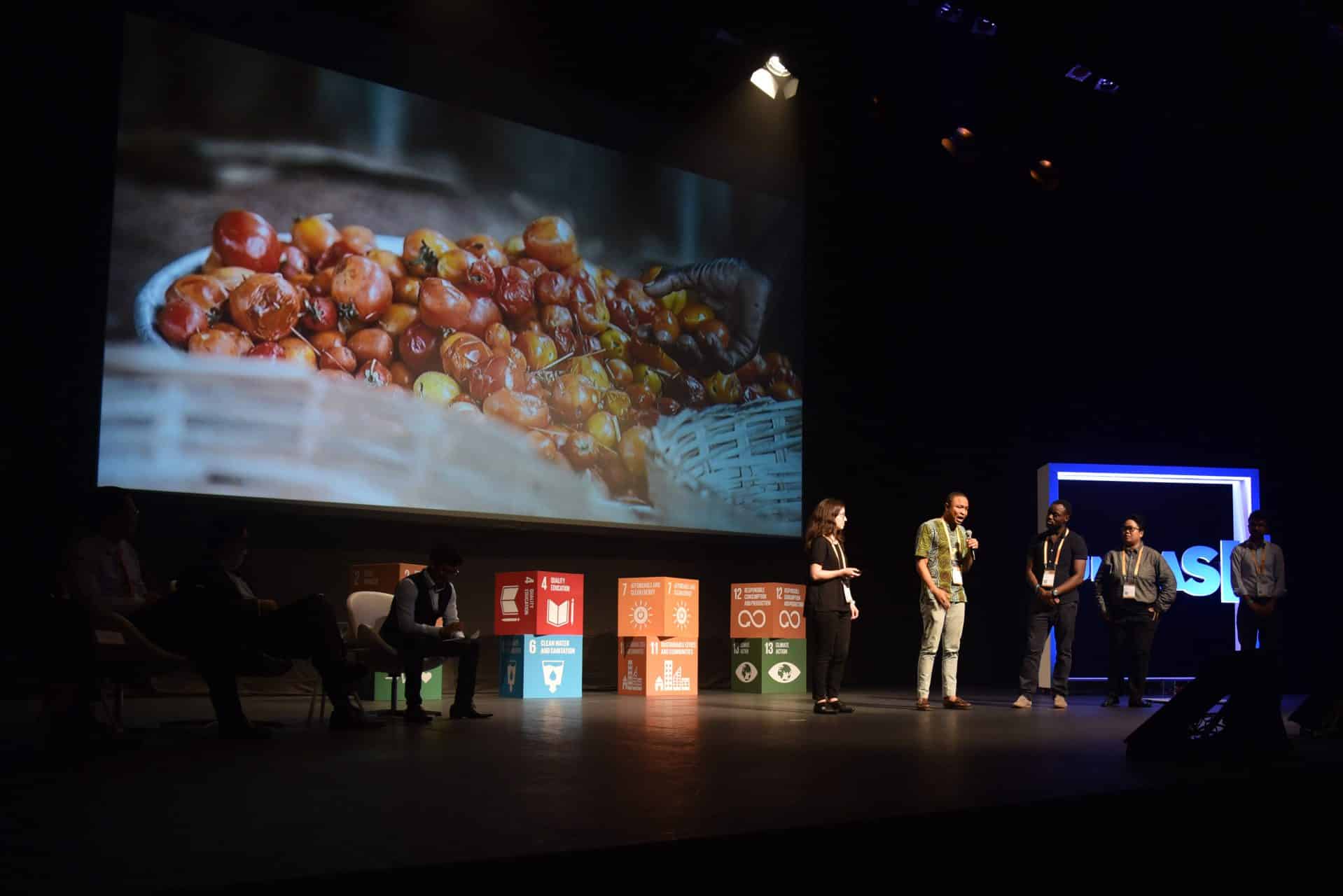
Winners of SDG 2: Zero Hunger
Gold winner: Net-To
Net-To won the Gold Award in their track for their solution to reduce post-harvest losses.
Farmers in rural Nigeria face drastic post-harvest losses due to pests and environmental factors. By shortening drying-time, reducing contact with contaminants and bruising during post-harvest handling, the solution solves these issues.
Net-To is a hammock-like sleeve designed to improve the sun-drying process of tomatoes, while keeping them off the ground. Currently, tomatoes in Nigeria are sun-dried on the open-field with little protection against environmental contaminants. Using Net-To, a farmer would:
- Place the freshly-harvested tomatoes into Net-To sleeve nets.
- Wash and dip these sleeves into an aqueous capsaicin solution, which would both cool the tomatoes and improve anti-microbial properties.
- Hang it between two poles to maximize drying surface, increase aeration and reduce contact with contaminants.
- A zipper ensures access to remove damaged tomatoes from the sleeves with minimal effort.
Based on this innovation tomato losses can be reduced by up to 18 %.
This solution is suitable for smallholder farmers who are still practicing open-field sun-drying and cannot access preservation option such as processing hubs or other storage facilities due to financial challenges or accessibility issues. By reducing their losses their income increases, which leads to improved financial capacity and better capability to provide for their family.
Silver winner: Donkey Bagpack
The solution Donkey Bagpack was given the silver award at Dragons’ Den for their solution which could cut down food waste.
15-40% of farm produce in Ghana perishes post-harvest despite cooling technologies that would reduce losses and despite demand for the produce that is going to waste. To date, cooling technologies are too expensive or too complex for Ghanaian farmers. Donkey Backpack is a modular cooling storage container that manages post-harvest loss by reducing exposure of food crops to heat, as well as damages in post-harvest handling. It is comprised of cooling bags that use simple evaporation technology to increase the shelf-life of harvested fruits and vegetables. Bags can be stacked together to form a bigger storage unit and can also be taken apart, depending on the preference of the farmer.
Donkey Backpack leverages local materials to reduce cost. Since donkeys are mostly owned and used by rural small holder farmers in their farming activities, the storage container is designed to be portable on donkeys. They can also be carried by farmers or used within motorized vehicles.
Donkey Backpack can be produced for less than $5 USD, is versatile, is easily maintained, and can be easily used by the majority of farmers who are female.
The users are rural smallholder horticultural farmers in Ghana who mostly grow fruits and vegetables on a semi-commercial basis. It reduces their post-harvest loss by giving their food crops more shelf life, which enhances their food security and creates more commercial opportunity.
Bronze winner: Drunner
Drunner won for their solution, which aims to give small holder farmers access to financial services.
In Nigeria, previous attempts to give small holder farmers access to much needed credit and insurance have relied on subsidies and proved unsustainable, further fueling the bad perception financiers have of farming. The solution is to launch a data service provider that will operate drones gathering large scale data on farms, process and distribute the data to financial service providers – banks and insurers, to better assess farmer risk at low cost, to provide customized financial products.
Financial exclusion remains high for farmers in the developing countries. However, financial service providers (FSPs) have failed to come up with a sustainable model to serve this segment. High demand for credit and insurance by farmers could prove a profitable market for them.
Drunner’s data service provider will operate drones. They will fly over farm areas and gather large scale data. The algorithm will process the data and generate an assessment of the quality of crops, soil and farming techniques. Drunner will give insurers and banks access to these insights providing them with much needed information about their potential customers and thus de-risk agriculture portfolio. This would help overcome their high-risk perception and lack of information. With decreased risk and cost-efficient monitoring, FSPs will be able to give farmers more insurance and more loans at lower premium and interest rates.
Drunner provides FSPs with a target market of 5 million small holder farmers which represent a market opportunity of USD 2.5 bn for banks and USD 1bn for insurers. Ultimately these 5 million small holder farmers are now included into the formal financial sector and can leverage on that to diversify their crops, expand their working capital and have access to training.

